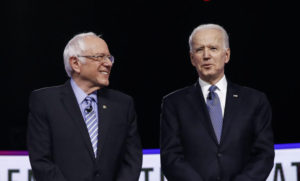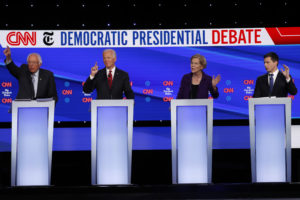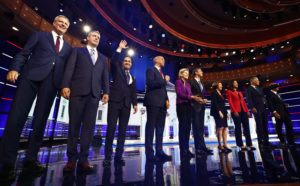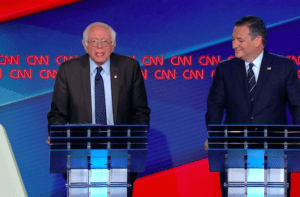Blue-Collar Challenge for Democrats
The GM-UAW labor contract could prove to be a victory of innovative thinking in the private sector. Now politicians should be clear on how they would attack the deepening problems that confront working people.WASHINGTON — The General Motors contract with the United Auto Workers shows how companies and workers can come together when both understand the economic threat facing American manufacturing, and when workers have a place at the table to protect their most important interests.
But few American workers have the negotiating power that the UAW has won over the years. Indeed, many employees — including white-collar workers and professionals — are losing leverage in a global labor market where wages can be bargained down easily, and in an American private sector in which unions hold less and less sway.
This is the great challenge facing Democrats, and progressives in all countries. The left has partial answers that are, on the whole, better than the pure laissez faire offered by the right, which mostly wants to wish the problem away. But to govern successfully, progressive parties — and especially the Democrats — need more clarity than they have now on how to save middle-class living standards, how to grapple with the impact of global trade, and how to marry economic dynamism with social justice.
Democrats might complain that more is being asked of them than of Republicans. Well, yes. It is harder to swim against the economic tides, but that’s the job Democratic candidates are signing up for when they claim to speak for the forgotten and the struggling. Bellyaching is pointless.
The media could help, too. How often do we need to parse every tiny nuance of each candidate’s already well-known position on Iraq? Why can’t news organizations host debates focused solely on how to build a just and growing economy in a world very different from the one our grandparents inherited? Maybe GM and the UAW could co-sponsor it.
The importance of their agreement cannot be overestimated. Union-bashers say that “labor bosses” don’t understand basic economics and impose terrible burdens on American companies — “burdens” such as middle-class wages, healthcare coverage and decent pensions. (Why, by the way, do so many complain about $80-an-hour packages of pay and benefits for workers but never about $750 an hour for lawyers, or $5,000 an hour for some CEOs?)
But workers and their leaders are not fools. They understand how much trouble the American auto industry is in — for reasons that cannot be explained entirely by labor costs.
Still, GM’s biggest cost problem is healthcare, particularly for retired workers. The UAW and its president, Ron Gettelfinger, came up with a genuinely innovative way to help GM, proposing the creation of a heathcare trust — it’s called a voluntary employees’ beneficiary association, or VEBA, destined to be the new hot acronym. GM would deposit at least $30 billion in the trust to cover the long-term healthcare liabilities for retirees. In return, GM would get rid of roughly $50 billion from its books for those obligations. Assuming a decent economy and decent investments, the VEBA would be expected to grow in value and eventually cover the larger costs.
The UAW got back guarantees of medical benefits and a pledge that GM would invest in its American plants. This, Gettelfinger says, would maintain the union’s current work force.
The UAW is taking a risk, since healthcare costs could rise faster than the trust fund grows, and since the contract includes fewer protections for non-production workers. But the bigger risk was GM going under or moving yet more jobs overseas. The lesson of The New Treaty of Detroit is that in the face of globalization’s challenges, risks and rewards can be shared if there’s a will to negotiate them.
Now it’s the turn of Democratic candidates to explain how they will be as creative as GM and the UAW. A few hours before the Democratic candidates joined in debate in New Hampshire on Wednesday, I sat down with a senator who has a lot of sympathy for what his colleagues are going through.
John Kerry resolutely declined to criticize or advise any of them and was quite candid about what he thinks he did wrong in his 2004 campaign. His core mistake, he thinks, was not giving voters enough reassurance on security issues related to terrorism.
But he did have a warning for advocates of free trade, of which he has been one. The country, he said, could “squander” its trade consensus if the promises of shared prosperity keep getting broken. “You can never eliminate, in a dynamic economy, dislocation and transition,” he said. “You can guarantee that the impact is limited, and not devastating.”
That’s the right promise. Who can keep it?
E.J. Dionne’s e-mail address is postchat(at)aol.com.
© 2007, Washington Post Writers Group
Your support matters…Independent journalism is under threat and overshadowed by heavily funded mainstream media.
You can help level the playing field. Become a member.
Your tax-deductible contribution keeps us digging beneath the headlines to give you thought-provoking, investigative reporting and analysis that unearths what's really happening- without compromise.
Give today to support our courageous, independent journalists.






You need to be a supporter to comment.
There are currently no responses to this article.
Be the first to respond.